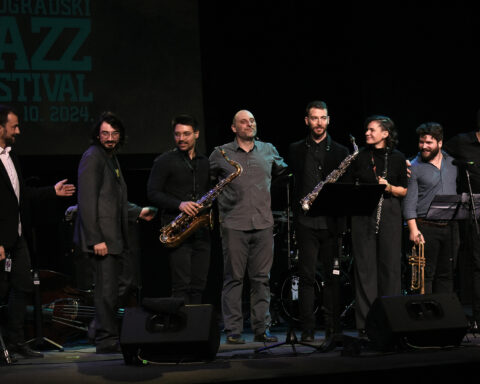Jazz presenters, administrators and cultural consultants — arts journalism educators, politicians and other influential public figures — leaders in jazz diplomacy efforts and curators of musicians’ homes turned into museums — all were be panelists in five free monthly interactive online panels in a series titled Talking Jazz, produced by Jazz Journalists Association.

Starting on Wednesday, September 18 at 8 pm EDT, the monthly sessions of Talking Jazz were 90-minute unpackings of issues vital to understanding the contemporary development of the music as a functional art form. The panels convened top experts and activists of both jazz-specific and more general cultural arts fields. They were aimed to engage professional practitioners of the musical and performing arts, grassroots supporters and also the general public. Attendees were able to pose questions to panelists, for real time responses. Attendance at the panels, held on Google Hangouts on the Air, has been free, but advance registration was required and was made HERE. All sessions have been archived for later free access.
Talking Jazz expanded on the periodic online webinars the JJA began to produce in 2011 with its celebrated eyeJAZZ video instructional series. They continued in 2012 as topical webinars. Talking Jazz upgraded the webinar experience by providing live streaming video of the panelists and series moderator Howard Mandel, president of the JJA.
Series sessions were:
- Where Will We Hear Jazz? 8 pm. EDT, Wednesday, September 18. Panelists: Gene Dobbs Bradford, executive director of Jazz St. Louis; Adrian Ellis, former executive director of Jazz at Lincoln Center, principal of AES Consulting; Meghan Stabile, producer/presenter Revive Music, discuss issues regarding institutions, clubs and other venues. more info & registration
- What Should Arts Journalists Know? 8 pm. EDT, Thursday, October 10. Panelists: Johanna Keller, director of the Goldring Arts Journalism Program, Syracuse University, and Douglas McLennan, founder of ArtsJournal.com, Associate Director of the USC Arts Journalism Program at Annenberg School for Communications and Journalism, talk about what’s being taught in academic courses for emerging arts journalists. more info & registration
- Federal, State and City Arts Funding 8 pm ET Wednesday, November 20. Panelists: Michael Faison, director of the Idaho Commission on the Arts; Jennifer Johnson Washington, Mayor’s Office of Special Events, Chicago (presenter of the annual Chicago Jazz Festival) and Congressional representatives tba unfold the links between U.S. government support for the arts, especially jazz, and local efforts at the state and city level. more info & registration
- Jazz Diplomacy Now 8 pm ET, Wednesday, December 18. Panelists: Simon Rowe, director of the Dave Brubeck Institute, University of the Pacific, Stockton CA and pianist Danilo Perez, director of the Berklee Global Jazz Institute, speak of efforts to employ jazz internationally as a tool for education, peace and conflict resolution. more info & registration
- Museums Keep Jazz Alive 8 pm ET, Wednesday, January 22. Panelists: Michael Cogswell, director, Louis Armstrong House Museum; John Edward Hasse, curator of American Music, Smithsonian Institution. more info & registration
The JJA’s intent in producing the series has been to stimulate well-informed discussion of significant and timely issues regarding jazz and jazz journalism among all friends and followers of the music. A second season of Talking Jazz, to run monthly from February through June 2014, is currently in planning stages.
Talking Jazz is presented by The Jazz Cruise as part of its Anita E. Berry Jazz Education Fund, with further support from Century Media Partners. Direct inquiries about participating in Talking Jazz or sponsoring JJA activities to Howard Mandel, President@JazzJournalists.org.






I think it an unjust travesty that the legendary Al Cohyn is not included in the Down Beat magazine Jazz Hall of Fame. His contributions to the music through performances, original manuscripts and arrangement for exemplary big bands is unsurpassed. There are some"artists/musicians"? currently in the Hall of Fame whose contributions to the music are, at best, minimal compared to What Mr. Cohn devoted to American jazz.